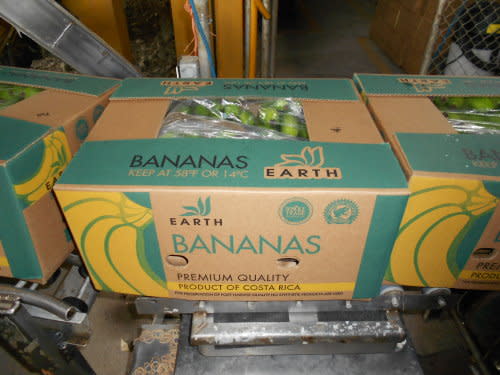Every Day Is Earth Day With This Market Darling
Many companies go out of their way to display their commitment to the earth on Earth Day. However, here's a company that lives by an environmentally conscious code of ethical conduct: Whole Foods Market (NAS: WFM) .
Green and clean
The Austin, Texas-based organic grocery retailer has always had environmental initiatives high on its to-do list, and way before green behavior was "cool."
Whole Foods was the first major retailer to offset 100% of its energy use with wind-energy credits, for example. It also uses green building techniques, solar power, companywide recycling programs, and, of course, support for organics and locally grown fare.
And the company keeps on upping its commitment. Take its newest efforts through ratings systems to help consumers make informed and environmentally sustainable decisions.
One of these is its Eco-Scale rating criteria for cleaning products, which Whole Foods launched on Earth Day one year ago. Fast forward one year, and 90% of the cleaning products the grocer carries will meet the criteria.
The Eco-Scale ratings system is superior to labeling on conventional cleaning products because it mandates that these products reveal all ingredients -- something the government doesn't actually require. It also doesn't allow products with phosphates or chlorine, and it gives top billing to cleaners that use 100% plant-based ingredients.
Greening the sea
Until now, Whole Foods' color-coded seafood sustainability initiative included rating its wild-caught seafood according to whether the species were overfished or caught by methods that could harm other marine life. The green rating signaled an environmental "best choice." Yellow indicated that despite some concerns with fishing methods, the species is still a "good alternative." Red urged customers to "avoid" the species because of its having been overfished or because of the use of environmentally detrimental fishing methods.
Years ago, Whole Foods stopped selling fish that were extremely depleted from ocean ecosystems, like orange roughy, shark, and bluefin tuna. (Animal welfare is also high on Whole Foods' agenda; in just one seafaring example, it stopped carrying live lobsters way back in 2006 in line with its commitment to humane treatment and quality of life for animals.)
Whole Foods has now taken its commitment one step further by no longer carrying the red-rated seafood. Such overfished, non-sustainably caught seafood includes all Atlantic Halibut and octopus, as well as swordfish and tuna from specific areas or catch methods red-rated by its partners Monterey Bay Aquarium and Blue Ocean Institute.
Issues like this matter to many consumers, not to mention environmental activist groups. In 2010, Greenpeace targeted retailers like Costco (NAS: COST) and Trader Joe's for their seafood sourcing. (Both companies responded to the criticism by either pulling threatened species or making detailed sustainability plans.) In 2011, Greenpeace ranked Safeway (NYS: SWY) , Target (NYS: TGT) , Wegman's, and Whole Foods as top five in seafood sustainability initiatives -- with, of course, room for improvement.
Not-so-impossible dreams
Whole Foods also has relationships with suppliers that put sustainability and other good works high on the agenda. Products under its Whole Trade Guarantee promise high quality standards, more money to producers, better pay and working conditions for workers, and the use of sound environmental practices.
In February, I traveled to Costa Rica to see how one supplier under the Whole Trade Guarantee works firsthand. EARTH University supplies sustainable bananas to Whole Foods, but most of its mission has to do with educating its students about sustainable agriculture. As an EARTH U "student" for five days, I got an education in the inspirational capabilities of such programs with suppliers.
EARTH University managed to do what many mistakenly thought was "impossible" decades ago: turn a working banana plantation into a sustainable, ecologically friendly operation. In this article, I explained ways EARTH University farms bananas using methods that encourage waste reduction, biodiversity, and conservation.

Relationships like the one between EARTH U and Whole Foods are good for the planet and people. A portion of the proceeds from all saless of EARTH U bananas at Whole Foods go back to the school, helping fund sustainability education for kids from more than 25 countries, many of them rural.
Earth Day every day
Consumers are increasingly embracing and even demanding green products and lifestyles, and many corporations are trying to catch up with what these shoppers expect. However, Whole Foods' long-standing dedication to this mission has proved that it's ahead of the curve in responsible business practices and conscious capitalism. It's been helping consumers make these educated decisions all along and is improving the ways it does so over time.
Companies that are ahead of the green, responsibility megatrend are exactly the kind investors should seek. When it's Earth Day every day, business fulfills its positive promise in the world.
Investor-friendly
Whole Foods isn't just friendly toward the environment. Shareholders who got in early already have a mutlibagger on their hands. I learned about Whole Foods through our Motley Fool Stock Advisor service, which has crushed the market since inception. You can Discover the Next Rule-Breaking Multibagger that its sister service, Motley Fool Rule Breakers, has picked today. It's free -- learn more.
At the time thisarticle was published Alyce Lomaxowns shares of Whole Foods Market. The Motley Fool owns shares of Costco Wholesale and Whole Foods Market.Motley Fool newsletter serviceshave recommended buying shares of Whole Foods Market and Costco Wholesale. The Motley Fool has adisclosure policy. We Fools don't all hold the same opinions, but we all believe thatconsidering a diverse range of insightsmakes us better investors. Try any of our Foolish newsletter servicesfree for 30 days.
Copyright © 1995 - 2012 The Motley Fool, LLC. All rights reserved. The Motley Fool has a disclosure policy.

